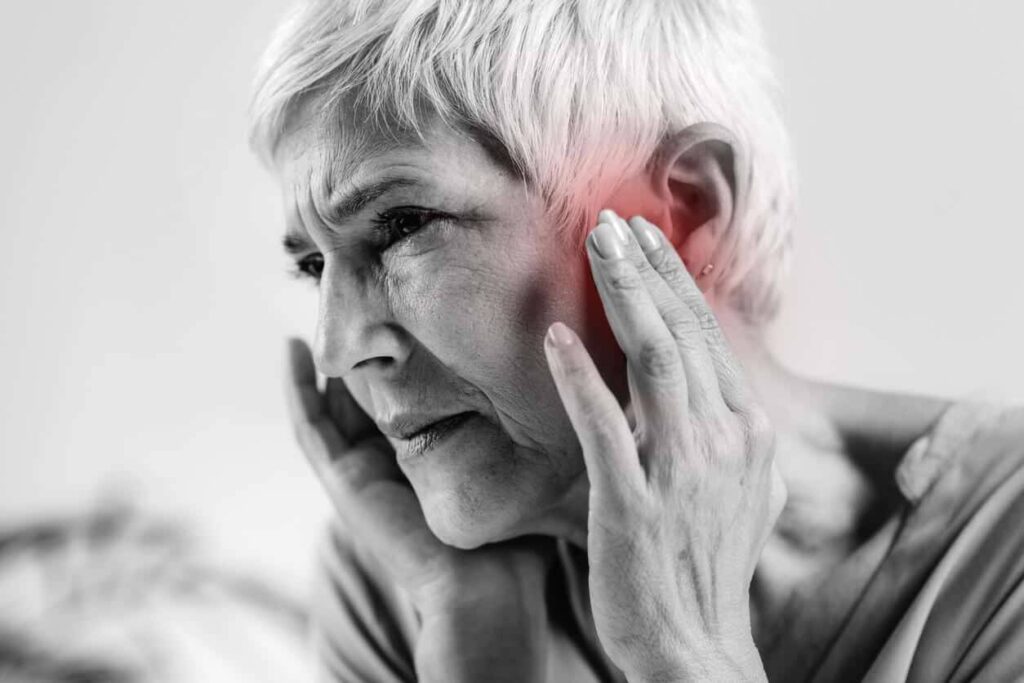Have you ever wondered if your arthritis could be affecting your hearing? While most people associate arthritis with joint pain and stiffness, it can sometimes cause problems beyond the joints, including issues with your ears and hearing.
Arthritis, especially types like rheumatoid arthritis and osteoarthritis, can lead to inflammation and changes in the bones and tissues around your ear. This can cause symptoms like hearing loss, ringing in the ears (tinnitus), or trouble understanding conversations.
In this blog, we’ll explore how arthritis can impact your hearing, the common signs to watch for, and what you can do to protect your ear health. If you have arthritis and notice any hearing problems, it’s important to understand the connection and take steps to maintain your hearing.
Contents
How Arthritis Can Affect Hearing?
 Arthritis can affect your hearing in several ways, mainly because it causes inflammation and damage to the joints and tissues around the ear. Here’s how arthritis can impact your hearing:
Arthritis can affect your hearing in several ways, mainly because it causes inflammation and damage to the joints and tissues around the ear. Here’s how arthritis can impact your hearing:
- The temporomandibular joint (TMJ), located near the ear, can become inflamed or damaged in arthritis, causing pain and sometimes affecting hearing.
- Inflammatory arthritis, like rheumatoid arthritis, can cause swelling in the small joints and tissues of the ear, leading to problems with sound transmission.
- Arthritis can affect the bones in the middle ear, which are responsible for carrying sound vibrations to the inner ear, potentially causing conductive hearing loss.
- Chronic inflammation can damage the delicate structures of the ear, increasing the risk of sensorineural hearing loss (damage to the inner ear or auditory nerve).
- In some cases, arthritis-related changes can lead to tinnitus (ringing or buzzing in the ears), which can be distressing.
Overall, arthritis can cause hearing difficulties by affecting both the mechanical and neurological parts of the ear, making it important to monitor ear health if you have arthritis.
Types of Arthritis and Their Imapct on Hearing
| Aspect | Rheumatoid Arthritis (RA) | Osteoarthritis (OA) |
|---|---|---|
| Nature of Disease | Autoimmune inflammation attacking tissues | Degenerative joint disease due to cartilage breakdown |
| Cause of Hearing Loss | Inflammation of middle ear bones and auditory nerves | Wear and tear affecting joints near the ear (TMJ) |
| Type of Hearing Loss | Both conductive and sensorineural hearing loss | Mainly conductive hearing loss |
| Ear Structures Affected | Middle ear bones, auditory nerve, surrounding tissues | Temporomandibular joint (TMJ) and nearby bones |
| Additional Ear Issues | Increased risk of ear infections and fluid buildup | Joint pain and stiffness affecting ear function |
| Symptom Onset | Gradual, linked to autoimmune flare-ups | Gradual, linked to mechanical joint damage |
| Associated Symptoms | Ear pain, tinnitus, swelling | TMJ pain, stiffness, occasional hearing difficulty |
Symptoms of Arthritis-Related Hearing Issues

- Muffled or reduced hearing
- Ringing or buzzing in the ears (tinnitus)
- Difficulty understanding speech, especially in noisy environments
- Ear pain or discomfort
- Feeling of fullness or pressure in the ear
- Sensitivity to loud sounds
- Occasional dizziness or imbalance
How to Protect Your Hearing if You Have Arthritis
If you have arthritis, taking care of your hearing is essential to prevent or reduce hearing loss. Here are some simple tips to protect your ear health:
- Get Regular Hearing Check-ups: Schedule routine hearing tests, especially if you notice any changes in your hearing or ear discomfort. Early detection can help manage problems before they worsen.
- Manage Arthritis Inflammation: Follow your doctor’s advice to control arthritis symptoms and reduce inflammation, as this can lower the risk of ear-related complications.
- Avoid Loud Noises: Protect your ears from loud environments by using earplugs or noise-canceling headphones to prevent additional damage.
- Limit Use of Ototoxic Medications: Some medications can harm your hearing. Always discuss potential side effects with your doctor before starting new treatments.
- Maintain Overall Health: A healthy lifestyle—balanced diet, regular exercise, and managing stress—supports both joint and ear health.
- Stay Hydrated: Proper hydration helps maintain the fluid balance in your ears, reducing dryness and irritation.
By being proactive and attentive to your hearing health, you can reduce the impact arthritis has on your ears and maintain better quality of life.
When to See a Specialist
If you’ve been diagnosed with arthritis and are starting to notice signs like ringing in the ears, difficulty hearing conversations, or a constant feeling of pressure in your ears — don’t ignore it.
These might not just be age or environment-related issues. In many cases, joint inflammation from arthritis — especially rheumatoid arthritis — can affect parts of the ear and trigger hearing problems.
But before rushing to an audiologist or ENT, it’s important to get your arthritis under control. The root cause of your ear troubles might just be the inflammation itself.
Managing your arthritis early can help prevent further damage — to both your joints and your hearing.
Worried about joint pain or stiffness? It’s time to speak with an expert.
Tap the button below to consult with a certified online orthopedic specialist and get the help you need — from anywhere.

